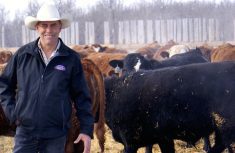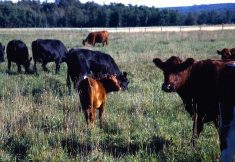The Canadian Cattlemen’s Association (CCA) has been dealing with a number of pressing issues on behalf of beef producers as the new year gets underway. Trade, of course, always occupies a significant portion of our time, so while that has not changed, circumstances within the U.S. administration are creating renewed uncertainty for industry to try to navigate. Given the current political difficulties for the new Democrat-controlled House of Representatives under Speaker Nancy Pelosi to co-operate with the Trump administration and pass legislation to implement the United States-Mexico-Canada Agreement (USMCA), the timing around ratification of the new agreement stateside is unclear.
Read Also

Growing Canada’s beef herd: CCA’s priorities working with new federal government
This is my first column since the federal election. The Canadian Cattle Association works with all elected officials and parliamentarians, regardless…
Despite all the uncertainty in the U.S., the agreement is still anticipated to come into force eventually. Thus, much of CCA’s discussion at the recent trilateral leaders’ meeting held during the National Cattlemen’s Beef Association (NCBA) Convention in New Orleans, Louisiana, focused on short- and long-term strategies in collaboration with our North American cattle producer organization counterparts. I reiterated CCA’s desire that the three countries move quickly to implement the new agreement without disruption, which will support stability and growth within cattle and beef markets across all three countries.
At the convention, NCBA indicated it will work to keep the existing North American Free Trade Agreement (NAFTA) in place until conditions are right to implement the USMCA. NCBA, Mexico’s Confederación Nacional de Organizaciones Ganaderas (CNOG) and CCA all agree that U.S. withdrawal from the existing NAFTA without implementation of USMCA would be a disaster for the beef sector and should not be a strategy that the U.S. administration pursues. Even so, President Trump’s threat to withdraw the U.S. as a tactic to pressure Congress should be taken seriously. In the meantime, all three cattle producer associations agreed to continue to express the immense value of the USMCA to our respective governments.
As lead of the Canadian delegation at the trilateral leaders meeting, I was pleased to update participants on the positive trade developments in Canada, including the implementation of the Comprehensive and Progressive Agreement for Trans-Pacific Partnership (CPTPP) and the Canada-EU Comprehensive and Economic Trade Agreement (CETA). Through these agreements, Canadian beef has access to lucrative and influential new markets that will help increase the value of every animal produced.
USMCA, known in Canada as the Canada-United States-Mexico Agreement (CUSMA), figured prominently in trade discussions at the American Farm Bureau Federation (AFBF) annual convention as well. There, the CCA also took the opportunity to engage with Europeans on Canada-EU trade at an event earmarked for U.S.-EU relations. Many of the agriculture trade officials in attendance also have mandates for Canada and will be visiting in the upcoming year. The CCA will continue to engage with these and other officials going forward.
On the home front, the release of Canada’s new Food Guide caused a bit of stir. Lean red meat, such as beef, is rightfully acknowledged as a nutrient-rich and healthy protein in the new food guide. Importantly, Health Canada guidance is not directly stating there is a need to reduce red meat but rather a need to eat more plant-foods. However, our concern is that some Canadians may interpret this as meaning that plant-based proteins are healthier and a signal to remove red meat from their diets. General dietary advice to reduce red meat consumption for all Canadians is of course ill-advised as it could put some Canadians at risk of iron, zinc, vitamin B12 deficiencies and inadequate protein intake.
The CCA will continue to advance beef as a sustainably raised, high-quality protein of benefit to the human diet to the federal government and the Minister of Health. We know Canada is a great place to raise beef and is perhaps one of the most sustainable agriculture systems in the world. In many places in Canada, raising cattle is the best and most environmentally beneficial use of the land.
Canadian farmers and ranchers are leaders in environmental stewardship and sustainability. Raising beef cattle in Canada accounts for 2.4 per cent of Canada’s greenhouse gas (GHG) emissions. On a global scale, GHG emissions from Canadian beef production accounts for 0.04 per cent of global GHG emissions — one of the lowest greenhouse gas footprints in the world.
Also of note, the Government of Canada recently released its final list of designated regions where livestock tax deferral has been authorized for 2018 due to drought conditions. The CCA appreciates that the list of prescribed areas has been expanded given the dry conditions scattered across the country last summer. However, delays in enacting the tax deferral and using municipal or county boundaries to determine eligibility remain challenges that reduce the effectiveness of this management tool. Cattle producers believe modifications to the livestock tax deferral could improve the utility of this management tool, such as individually driven election of partial income deferral when producer incomes are artificially inflated by forced sales due to extreme weather challenges.
These and other important matters will be discussed at CCA’s 2019 Annual General Meeting (AGM) in Ottawa March 20-22, 2019. I hope to see many producers attend these meetings and become informed and engaged in the good work that the CCA carries out on their behalf.
Until next time.
















